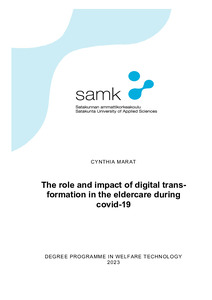The role and impact of digital transformation in the eldercare during covid-19
Marat, Cynthia (2023)
Marat, Cynthia
2023
All rights reserved. This publication is copyrighted. You may download, display and print it for Your own personal use. Commercial use is prohibited.
Julkaisun pysyvä osoite on
https://urn.fi/URN:NBN:fi:amk-202305078064
https://urn.fi/URN:NBN:fi:amk-202305078064
Tiivistelmä
The main objective of this study is to focus on creating a role and impact of digital transformation in the Eldercare during COVID-19 Pandemic. This study was conducted with the collaboration from Satakunta University of Applied Sciences (SAMK).
The data collected for specific data for the research, the different data bases that are considered include SCOPUS, Cochrane, and Google Scholar are the databases used for collecting the data about the current study. The main reason for choosing these databases is because they include peer reviewed articles, and most of these databases are used by different researchers in their studies.
The pandemic triggered by the New Coronavirus (Covid-19) has caused social changes in the lives of the population, especially in vulnerable groups, such as the elderly, who have been keeping themselves in social isolation to avoid contamination. Faced with this scenario, the elderly expanded their forms of communication and adopted the use of digital technologies. Furthermore, faced with this situation, many elderly people who live alone in their homes or with their family members and those who live in long-stay institutions were surprised by the impossibility of receiving visits from family members and friends; some had their caregivers away to preserve the risk of contagion.
Thus, a change in routines and behaviours imposed by the pandemic re-quired staying at home and environment, avoiding maximum exposure to the virus. The pandemic demonstrated the importance of adherence to new behaviours and life habits in different scenarios, pointing out issues that have become emerging for elderly care considering the adoption of different digital technologies.
This thesis was conducted using a scoping review considering a qualitative exploratory study with the aim of identifying the role and impact of digital transformation in eldercare during the COVID-19 pandemic. Moreover, the literature search was conducted using SCOPUS, Cochrane, and Google Scholar. The studies included in the review are all in English language considering the publishing year 2020 to 2022. Thus, the study concluded that the pandemic has shown that digital solutions can play a key role in supporting the delivery of elder care, both in terms of operational efficiency and in terms of care quality. The implementation of digital solutions has the potential to support care homes in meeting the challenges posed by the pandemic and to improve the quality of care for residents.
The data collected for specific data for the research, the different data bases that are considered include SCOPUS, Cochrane, and Google Scholar are the databases used for collecting the data about the current study. The main reason for choosing these databases is because they include peer reviewed articles, and most of these databases are used by different researchers in their studies.
The pandemic triggered by the New Coronavirus (Covid-19) has caused social changes in the lives of the population, especially in vulnerable groups, such as the elderly, who have been keeping themselves in social isolation to avoid contamination. Faced with this scenario, the elderly expanded their forms of communication and adopted the use of digital technologies. Furthermore, faced with this situation, many elderly people who live alone in their homes or with their family members and those who live in long-stay institutions were surprised by the impossibility of receiving visits from family members and friends; some had their caregivers away to preserve the risk of contagion.
Thus, a change in routines and behaviours imposed by the pandemic re-quired staying at home and environment, avoiding maximum exposure to the virus. The pandemic demonstrated the importance of adherence to new behaviours and life habits in different scenarios, pointing out issues that have become emerging for elderly care considering the adoption of different digital technologies.
This thesis was conducted using a scoping review considering a qualitative exploratory study with the aim of identifying the role and impact of digital transformation in eldercare during the COVID-19 pandemic. Moreover, the literature search was conducted using SCOPUS, Cochrane, and Google Scholar. The studies included in the review are all in English language considering the publishing year 2020 to 2022. Thus, the study concluded that the pandemic has shown that digital solutions can play a key role in supporting the delivery of elder care, both in terms of operational efficiency and in terms of care quality. The implementation of digital solutions has the potential to support care homes in meeting the challenges posed by the pandemic and to improve the quality of care for residents.
